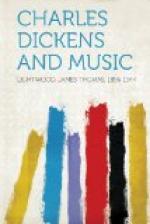A further mixture of quotations occurs when he is talking of Florence on another occasion. Speaking of the supposed death of Walter he says,
Though lost to sight, to memory
dear, and
England, home, and beauty.
The first part—which is one of Cuttle’s favourite quotations—is the first line of a song by G. Linley. He composed a large number of operas and songs, many of which were very popular. The second part of the quotation is from Braham’s ‘Death of Nelson’ (see p. 116).
In conversation with his friend Bunsby, Cuttle says—
Give me the lad with the tarry
trousers as shines to
me like di’monds bright,
for which you’ll overhaul the
‘Stanfell’s Budget,’
and when found make a note.
Elsewhere he mentions Fairburn’s ‘Comic Songster’ and the ‘Little Warbler’ as his song authorities.
The song referred to here is classed by Dr. Vaughan Williams amongst Essex folk-songs, but it is by no means confined to that county. It tells of a mother who wants her daughter to marry a tailor, and not wait for her sailor bold.
My mother wants me to wed
with a tailor
And not give me
my heart’s delight;
But give me the man with the
tarry trousers,
That shines to
me like diamonds bright.
After the firm of Dombey has decided to send Walter to Barbados, the boy discusses his prospects with his friend the Captain, and finally bursts into song—
How does that tune go that the sailors sing?
For the port of Barbados, Boys!
Cheerily!
Leaving old England behind us, boys!
Cheerily!
Here the Captain roared in chorus,
Oh cheerily, cheerily!
Oh cheer-i-ly!
All efforts to trace this song have failed, and for various reasons I am inclined to think that Dickens made up the lines to fit the occasion; while the words ‘Oh cheerily, cheerily’ are a variant of a refrain common in sea songs, and the Captain teaches Rob the Grinder to sing it at a later period of the story. The arguments against the existence of such a song are: first, that the Dombey firm have already decided to send the boy to Barbados, and as there is no song suitable, the novelist invents one; and in the second place there has never been a time in the history of Barbados to give rise to such a song as this, and no naval expedition of any consequence has ever been sent there. It is perhaps unnecessary to urge that there is no such place as the ‘Port of Barbados.’
Dick Swiveller
None of Dickens’ characters has such a wealth of poetical illustration at command as Mr. Richard Swiveller. He lights up the Brass office ‘with scraps of song and merriment,’ and when he is taking Kit’s mother home in a depressed state after the trial he does his best to entertain her with ’astonishing absurdities in the way of quotation from song and poem.’ From the time of his introduction, when he ’obliged the company with a few bars of an intensely dismal air,’ to when he expresses his gratitude to the Marchioness—




